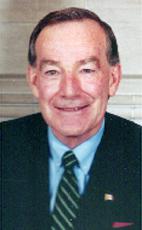Mr. Speaker, it gives me great pleasure to participate in the debate and to pay tribute, as have past speakers who are either for or against the concept of Remembrance Day.
I had the opportunity to follow my father to Europe in the early 1950s when the Canadians went over and I saw the devastation in the countryside. I spent a lot of my younger life serving in the NATO forces. Nothing can teach like visiting a graveyard with the headstones of 5,000 to 10,000 soldiers. I refer to the second previous speaker who mentioned his father joining at 18 years of age. I went into Beny-sur-Mer and saw 19 and 20 year old sergeants; they hardly let them lead a section today. These young people gave their lives. I saw their graves for miles.
Nothing struck me more than when I went to Vimy Ridge and saw the massive battlefield and the Canadian monument which is part of Canada in France. Later I went to Verdun and saw on the hill, as far as the eye could see in the trees, the white markers where a million people had died in the first world war around Verdun, both German and French soldiers. The slaughter in those periods touched me deeply.
I hope we never have to see it again, but the remembrance of such an event was burnt deeply in my mind. As a consequence I hope we can teach in school about the history of wars. Although it can be a vicarious kind of experience for the teacher and the students, it can ask people to remember not to make the same mistakes of the past. We can imagine what it must feel like never to have returned.
Those are questions that are deep and piercing. Neither the teaching of history nor the experience of imagination come close to explaining the depth and intensity of the experiences of generations of Canadians who went through the first war, the second war and the Korean war. Some of them had such horrible experiences they will never talk about the war; they have a bond of silence concerning their experiences. Sometimes we can never get some people to stop talking about them, but that is the spectrum of the effect of those experiences on them.
That is why we gather as Canadians to remember and to give thanks in our hearts for the peace and freedom our forefathers brought to us from those wars. Never as Canadians have we ever sought to go to a war with unjust cause. We have never sought to go to war to take a piece of another country's land. We have always gone for an honourable and just cause. For that we should be proud.
Some older people know about the personal way of the sacrifices but they are fast leaving us. There are few working people who experienced the second world war. There are some who experienced the Korean war. There are no oral histories to be given in the future. There must be some tangible recognition of that sacrifice which gives people a moment to reflect.
One thing struck me. Every family had a right to select what would go on the headstones. I was 21 years old when I saw the headstone of a 21-year old corporal from the Winnipeg Rifles. It read: "To all the world he was a soldier. To me he was all the world".
It was a rather choking experience because I never really got too emotional about it. I got into it as a young guy, all gung-ho, ready to go and do my bit for my country and to gain some experience. That may have the motivating force for some of our soldiers. However that headstone struck me as very sentimental.
These kinds of things are very tangible. I wish someone would make a reasonable video to capture the spirit, the headstones, the actions that took place on D-Day, and all other events they experienced. They should keep it short and sweet because war is hell. We must keep that in perspective. We never want to step into it.
The older people remember the dark days of war. It left great impressions with them. In my father's family there were three boys. One joined the army. One joined the navy. One joined the air force. They all had different experiences but all came back with different attitudes. However one thing they had as a group was that they never wanted to go to war again. That was significant. However the cause being just can be presented in a way that may motivate people like them to go at it again.
I have seen the news coverage of D-Day re-enacted and the role that Canadians played in a proud way, giving up their lives. When I was there I represented my regiment, the Queen's Own Rifles of Canada that landed at Beny-sur-Mer. I was serving with a fellow in the regiment who was had been there. He was a platoon commander. Of all 110 men in the company that went in, 19 survived. It is an awful to think about what we left on the beaches. We had with us some of the sergeants who had served in other companies at the same time. They kept our history alive by making an attempt at their objectives on D-Day, which as we know eventually broke the back of the Nazis and brought peace to the world for a short period of time until the Korean war.
I ask members to give due consideration to tangibly recognizing that sacrifice. The people in the employ of the government are perpetuating governmental institutions to some effect. That is why I stand today to support the bill.

